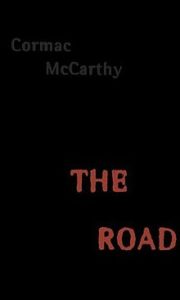
“…the right dreams for a man in peril were dreams of peril and all else was the call of languor and of death.”
I avoid Cormac McCarthy. Not only does reading novels in general bring out some goal-oriented anxiety in me, but his in particular read slow and produce a larger psychological angst – at least the ones I’ve read. Jim Harmon once said of Blood Meridian that it is sipping whiskey. And that’s the best description I’ve heard – you have to learn to love the burn and appreciate the age in the oak in good bourbon. McCarthy’s sentences are ancient in their music, but the violence they conceive burns going down.
The Road reads faster than Blood Meridian, but it’s easy to become overwhelmed with the realistic quality of McCarthy’s vision. His cadences have an ancient biblical quality, paired down in The Road, but biblical violence and horror are still omnipresent. It’s beautiful work, though (the same as his other novels), largely due to the contrast between language and subject matter. The beauty and effortlessness of the prose and imagery give meaning to the horror of a world where cannibals and marauders thrive.
“The boy sat tottering. The man watched him that he not topple into the flames. He kicked holes in the sand for the boy’s hips and shoulders where he would sleep and he sat holding him while he tousled his hair before the fire to dry it. All of this like some ancient anointing. So be it. Evoke the forms. Where you’ve nothing else construct ceremonies out of the air and breathe upon them.”
The boy and his father, the main characters of the story, are heading from Appalachia to the East Coast. They are just trying to survive in a post-nuclear apocalypse, but their survival is given a larger import because of their deceny in a fallen world. They are “carrying the fire.” What the fire is is not explicit, however it is surely the same fire Prometheus bestowed upon human kind in ancient times, and also the fire that ultimately burned all of humanity and scorched the land. McCarthy doesn’t need to tell us this, nor does he need to explain whether it’s better for the fire to always burn, or to die out. It’s ours to decide, or maybe, it’s beyond deciding.
Still, I wept uncontrollably re-reading the ending this morning. I was seeking an example of the language but didn’t get past where I had stopped reading when I finished it, a year after my son was born. Now that my son is old enough to talk and walk, the situation in The Road is even more heart-rending to me. This is not even to delve to deeply into the significance added by the current nuclear taunts being exchanged by the President and the leader of North Korea.
Re-reading the end, I am unbearably saddened for the boy who must carry on without his father, as I will one day have to do the same, and I hate myself for knowing I will one day have to leave my boy. We all leave them, eventually – we have to. It’s better than the alternative. Hopefully, I will not have to leave him before he’s grown, but carrying the fire, I have the darkness inside me too – and the darkness manifests in so many ways.
If McCarthy’s eminence as an author suffers from any contention among the reading public, it is probably because of his lack of strong female characters. He is typically regarded as a male writer for manly men. He’s not quite as bad as Hemingway, but his worlds are similar in their celebration of nihilism and masculinity. However I could argue that the obvious lack of virtue in McCarthy’s landscapes is in turn a celebration of virtue. The real world is so various that to describe a world so lacking in any feature is almost to set that thing aside and hold it as the necessary example. Perhaps the same could be said for feminity in McCarthy’s novels. I don’t know – I could be overreaching.
In The Road, the one clear anachronism is the mother’s suicide, leaving father and child behind. Necessary to McCarthy’s figurations, and the almost parabolic quality to this story (“Father”, “Son”, mankind), I still believe that, at least in our current time, women are stronger than men – the women I have known anyway. They carry on better in the face of reality, no matter how harsh. Men can’t see past their need to change what is. In short, I can’t see my wife abandoning her children as long as she had breath in her. I can say the same for most of the women I’ve been close to. I hope I wouldn’t leave my child in such a situation myself – though these are things we don’t know about ourselves until we are confronted with them, so it seems like posturing to say so with certainty. For that reason, and others, I’ll give McCarthy his last words:
“Once there were brook trout in the streams in the mountains. You could see them standing in the amber current where the white edges of their fins wimpled softly in the flow. They smelled of moss in your hand. Polished and muscular and torsional. On their backs were vermiculate patterns that were maps of the world in its becoming. Maps and mazes. Of a thing which could not be put back. Not be made right again. In the deep glens where they lived all things were older than man and they hummed of mystery.”
Credits: Book cover
